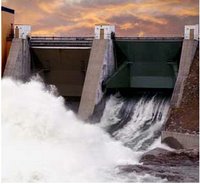
The Energy Bulletin reports that Swedish Prime Minister, Göran Persson, has founded a non-political committee with the intent of making the Scandanavian country fossil fuel-independent by the year 2020.
The members of the committee include Professor Christian Azar of Chalmers University of Technology, Leif Johansson, CEO of Volvo Group, makers of trucks, buses and heavy machinery, Birgitta Johansson Hedberg, CEO of the Swedish Farmers Supply and Crop Marketing Association and Christer Segersten, chairman of the Södra member-owned forestry group as well as representatives for the energy sector and industry.
The committee is charged with the task of studying and proposing measures and mitigation to reduce and then eliminate Sweden's use of fossil fuels. They will take the next six months to do their research and construct their recommendations and will present their findings and suggestions this summer.
An initial hearing in front of an assembled audience of journalists and other interested people held December 13th began with a speech from the Prime Minister. He cited concerns that Sweden is about to experience Peak Oil and therefore needs to assess measures to mitigate its effects and to transform society to adapt to it, including addressing how transportation and car use will look in the future. PM Persson underscored that Sweden is very fortunate to have vast agricultural and forestry resources, and to have excellent access to fresh water and no need for irrigation.
The Prime Minister's speech was followed by a short lecture introducing peak oil, by Association for the Study of Peak Oil (Sweden) chairman Kjell Aleklett which was in turn followed by the CEO of the Swedish Petroleum Association and professor Sven Kullander of the Royal Swedish Academy of Sciences. After lunch there were lectures on climate change by professor Christian Azar and Gunn Persson of Swedish Meteorological and Hydrological Institute, and statements from committee members, including Volvo CEO Leif Johansson. Volvo has conducted research into future fuels for commercial vehicles and mentioned peak oil before, and is converting one of it's factories to 100% renewable energy.
Sweden currently gets almost all of it's electricity from nuclear and hydroelectric power, and mostly relies on fossil fuels for transport; most of the heating has been converted to electric space heating, biofuels and waste recycling, while a small percentage remains fossil fueled. A 1980 referendum decided to phase out nuclear power as well, although the Energy Bulletin reports that this has been severely delayed so far, with the exception of the mothballing of the Barsebäck 1 and 2 reactors.
Here's what Sweden's current energy mix looks like (from an article on Sweden's renewable energy resources at Sweden.se 'the official gateway to Sweden):
As you can see, broadly speaking, Sweden’s energy mix consists of somewhat more than 40 percent oil, nearly as much renewable energy and 20 percent nuclear power.
Energy Bulletin reports that there has been a recent trend in Sweden towards increased sales of flexfuel E85 (ethanol) vehicles and fuel, and there are projects underway to increase domestic production of ethanol and synthetic fuels from forest industry waste. The commissions recommendations will almost surely involve an increased use of biofuels.
According to Sweden.se, "Since the international oil crises of the 1970s, the aim of Swedish energy and environmental policy has been to boost the share of renewable energy in the total mix. This has mainly been true of bioenergy, but also efforts to harness wind power and solar energy. The use of biofuels has risen sharply in the past 25 years, from 50 to nearly 100 terawatt hours (TWh). A large proportion of this increase is explained by the fact that more than 50 percent of district heating supply is based on biofuels. In the past 25 years, the Swedish manufacturing sector has replaced much of its oil consumption with electricity and biofuels."
Sweden obviously still has a long way to go however, especially if they still plan to phase out nuclear power as well. The country is blessed with large renewable resources however including already highly developed hydro resources as well as significantly underdeveloped wind resources. They will also likely turn to an even greater utilization of their rich biomass resources.
Iceland has also proposed to move towards a fossil-fuel independent future but has set the less ambitious date of 2050. I must give props to both nations for their efforts to move towards an entirely renewable future.
While Sweden and Iceland do have significant renewable resources, it must be noted that they do not necessarily have any more than many other nations, the United States and Canada included. If you're curious about what kind of renewable resources the U.S. has available and has yet to tap, check here for solar, wind and geothermal with a combined interactive map here. We certainly have the available resources to follow Sweden's lead and move towards a sustainable and renewable energy future. Do we have the willpower?
Wednesday, December 21, 2005
A Fossil-fuel Free Sweden by 2020? - Prime Minister Persson Says 'Lets Try'
Posted by
Jesse Jenkins
Ads at www.WattHead.org:
Wind Turbine Training
Solar Panels and Kits for the Home
Solar Energy Products and Home Solar Panels
Wind Turbine Training
Solar Panels and Kits for the Home
Solar Energy Products and Home Solar Panels
Subscribe to:
Post Comments (Atom)













1 comment:
Totally awesome. Sounds like real, sane, human leadership.
Post a Comment